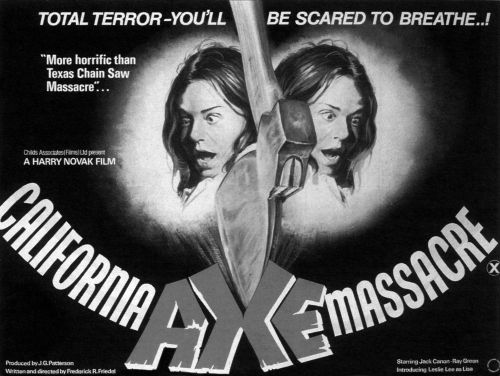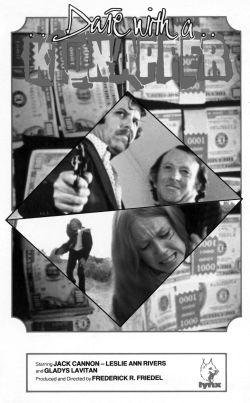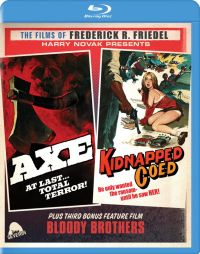
Stepping Outside Of The Box [2017-07-17]It’s fair to say much of exploitation cinema has little depth, memorability, or flare- as a genre exploitation does pretty much what it says box it exploits, be it horror, sex, race, etc. Frederick R. Friedel is one of the more note-worthy, creative & distinctive directors to come out of the 1970’s exploitation scene- releasing just two films in this decade- Axe & Kidnapped Coed ( aka Date With A Kidnapper)- both of these where thoughtful, well-conceived films- taking exploitation genre traits & twisting them to create memorable & often haunting cinema, that stands head & shoulders above run-of-the-mill exploitation. In 2015 Severin Films released both films( and their soundtracks) in a two disc Blu ray & CD release, so hopefully, both films will now get the praise & appreciation they truly deserve. Mr Friedel kindly agreed to give M[m] a rare email interview- discussing his films, influences, and of course the Severin reissue.M[m]: When did you're interest in film first develop? And where there any particular films that made you want to make your own movies?
FF: I took a photography class in college and immediately started taking moody, evocative pictures. Then I was cast in a play and fell in love with acting, too. Filmmaking seemed like the natural way to combine the two. Citizen Kane and The Conformist by Bertolucci were the two moves that made me want to make movies. Citizen Kane in particular. Welles put more visual creativity into each shot than you find in most movies. The Conformist is visually the most beautiful movie I've ever seen. I was so blown away by it I saw it three times in the same day. Just couldn't leave my seat.

M[m]:Your first released film was Axe- was this your first ever foray into film, or had you made shorts beforehand, and if so can you give details of these?
FF: I made one student film when I was at the University of Florida . It was about 8 minutes long and very surrealistic. At that time I was interested in creating the strangest, most evocative images I could think of. In the film I had one of my professors, a distinguished looking man with long gray hair, stand on a hillside with a boy dressed as a clown sitting near him. A knife dangles from a rope into the frame between them. He insults the clown repeatedly until the boy rises and stabs him over and over in the back, each thrust accentuated by quick in and out zooms and punctuated by loud cries. I was unaware of how much pain it must have unconsciously expressed about my relationship with my father until a student came up to me after a screening and said, " I feel sorry for you." At the time I didn't understand what he was talking about. I think Axe, or Lisa, Lisa, which was my original title, is also in some ways an expression of the troubled emotional dynamic of my family. With gallons of blood added, of course.
M[m]: Tell us a little bit about how Axe came about- how long was it in planning before you started to film it?
FF: Orson Welles was my hero and he made Citizen Kane when he was 25. So I set a goal to direct my first feature by the time I was 25. I heard that you could make low budget movies in Charlotte , North Carolina , so I raised $25,000 to shoot a movie there. I wrote the script while sitting in my investor's clothing store in Georgia . Because of the tiny budget, I tried to keep the number of characters and locations to a minimum. Roger Corman said, "You could make Dr. Zhivago for $50,000 but it wouldn't be Dr. Zhivago." So I wanted to do a story that was a fit for the money I had. There was a market for low budget horror movies for drive-ins back then so that's how the genre was chosen. I had never been on a movie set before so I didn't really know enough to do much planning. I found locations that I found visually interesting or where we could shoot for free. Hopefully both. I held a three-hour open audition and cast all the actors from it. Anyone else who came in that day I asked to be on the crew. I was very lucky that Jack Canon, Leslie Lee, and Ray Green showed up because whoever walked through the door was going to be in the movie. Luckily someone recommended Austin McKinney to shoot the movie. We started filming right away. We didn't really rehearse, just ran through a scene once just before we were ready to shoot. Because 35mm film stock was so expensive we rarely did a second take. We shot it in 8 1/2 days. We were all pretty young and the feeling was, "Wow, we're making a movie!"

M[m]: Axe has such a distinctive atmosphere- blending together often stark/ bleak moods, eerier symbolism, and moments of sudden shocking violence. Tell us a little bit about the editing/ cutting process?
FF: I was cutting it on an old fashioned moviola in the living room in my apartment. As I mentioned it was shot in 35mm, which took up most of the budget, so there was very little extra footage to chose from during the editing process. So the cutting style evolved mostly out of the necessity of making the limited footage work. We shot in winter which helped contribute to the bleak mood, as did the lighting of my cinematographer Austin McKinney, and the evocative score of my young composers George Newman Shaw and John Willhelm. Towards the end of my first rough cut, I found I was in over my head as an editor so I sought "professional help." Avrum Fine, an editor in Atlanta , helped turned my rough cut into a finished film. He had to use every scrap of film we had to make up for my lack of coverage during the shoot. We used everything we shot but the "slates", even the few feet of film we rolled before I called, "action" and after I said "cut".
M[m]: Also the films soundtrack helps with the mood/ feel of the film- was this composed scene-by- scene, or did George Newman Shaw & John Willhelm just present you with a collection of possible tracks, and you picked which to use?
FF: We could only afford a few hours in a recording studio so we played the movie and George and John just composed the score on the fly as they were watching it. They did a few variations and that was pretty much it. They also did a funny parody of a country and western song called, "Smellin' Up the Kitchen", that I wanted as counterpoint on the radio when the killers were driving through the south. They were very gifted and created some haunting pieces. Stephen Thrower, who's a great musician himself, told me that he used to play along with the soundtrack. Tragically, they were killed in a car accident about a year after the movie was finished. To this day no one who knew them has really gotten over the loss. David Gregory did an extraordinary documentary on them, "Moose Magic", for Severin Film's Blu-ray release of the movie. George and John also did the soundtrack for my second movie, "The Kidnap Lover", which was released as Kidnapped Coed. Severin also included the sound track for both movies and the first ever release of their original songs on the Blu-ray.
M[m]:Your second film was Kidnapped Coed ( aka Date With A Kidnapper)- I believe this was filmed shortly after Axe. The feel & the pace of the film is quite different( though clearly, it feels like a work of yours)- please tell us a little bit about how this project developed?
FF: I was editing the scene from Axe where Jack Canon is talking to Lisa in the kitchen and I was struck by how good he was. And I thought wouldn't it be great to have Jack in every scene of a movie? So I came up with the idea of him kidnapping a woman and going on the run with her. That would pretty much guarantee that he would be in every scene. I thought it would be interesting if what happened to them while on the run was so awful that it brought them closer together and they fell in love. At that time Axe was creating some excitement from screenings even before it was released. I had read that a filmmaker is hottest just before his first movie comes out so I convinced Irwin Friedlander, the executive producer, to let me shoot another movie while we still had most of the cast and crew together. "That way," I gushed naively, "We'll have two hits instead of one!" It didn't quite turn out that way.

M[m]: Though both Axe & Kidnapped Coed are often lumped in the exploitation bracket, there is a lot more depth, creativity & layers to both films. Are/ were you disappointed by the exploitation label? And are you a fan of the wider genre its self?
FF: I never thought of them as exploitation films. I don't think I even heard the term until years after I made them. I thought "Lisa, Lisa", which was my original title, was a story of a mentally ill girl who fought back against a gang of violent intruders. I thought I was making a low-budget suspense thriller with vague echoes of Polanski's "Repulsion". I was stunned when the distributor changed the title to Axe and sold it as a bloodthirsty horror movie, which it isn't. "The Kidnap Lover", which he renamed "Kidnapped Coed", was even more of a shocker to me. I thought I was making a love story about a sheltered girl who falls in love with her kidnapper when he ends up being her protector. I think the only thing really exploitive about it is that sleazy title. I had never seen any exploitation movies. I was watching films like "Badlands" and "Last Tango in Paris" at the time I made my movies.
M[m]:in 1999 you decided to cut together Axe & Kidnapped Coed- tell us a little bit about how & why this happened?
FF: I was so furious when the films were stolen by the distributor that I was desperate to get them back. I decided that if I could somehow cut the two movies together and create an entirely new story I could at least, in some fashion, have a movie that I could release. I knew it was a crazy idea that probably had never been done before, but because Jack Canon was the lead in both movies, I came up with the idea of identical twins who were separated at birth but go on a crime spree 35 years later on the very same day.... until their paths eventually cross. I did a rough cut of it in 1980 and put it away thinking it probably would never really work. I chalked it up to a therapeutic exercise which may have stopped me from throttling the distributor who stole them. Then my friend who taught film at a university played it for his film class. He said it was the first time that none of his students ever walked out on a screening! So I decided to finish it and that's how "Bloody Brothers" came about. Stephen Thrower came up with the idea of how to make their paths actually cross at the end even though it would obviously be impossible given that the footage was never shot and it was edited together from two different movies
M[m: Last year saw Severin Films released both Axe/Kidnapped Coed on Blu-ray for the first time. Please tell us a little bit about how this came about?
FF: Stephen Thrower, the author of Nightmare USA , was staying with me on his visit to Los Angeles . He devoted a chapter to my movies in his landmark book and almost single-handedly resurrected them. The two movies had been stolen by the distributor and I had completely lost touch with them for almost 30 years. I didn't know Axe had even played in England and I certainly didn't know that it had a following until Stephen contacted me to write about them for Nightmare USA . I thought they had just fallen off the face of the earth and died an anonymous death. Anyway, Stephen asked me to drive him to Hollywood for a dinner meeting with David Gregory from Severin Films. As I was dropping him off he asked me to come in to meet him. David immediately told me that he had distributed Axe in England and had been asked to introduce screenings for Axe in Los Angeles because no one even knew if I was alive or how to find me. He told me he had recently had his own move stolen by a distributor and could relate to the gut wrenching experience I must have gone through losing two of mine. He said he would help me get the rights back and Severin Films would release them on Blu-ray. I was so excited I could hardly sleep that night. Within two weeks we walked into the office of the distributor who stole them from me thirty years ago, and walked out with my movies! David and Severin Films did an extraordinary job on the Blu-ray. His own filmmaking expertise is on full display in all the extra features he shot for the release.
M[m]: one of the big extras with the Severin releases is the hour long doc At Last… Total Terror! – The Incredible True Story of AXE & KIDNAPPED COED. Tell us a little bit about how this came about?
FF: When David Gregory said he would release the movies on Blu-ray I asked him if he could include a tribute four people who made significant contributions to the movies who've since passed away. They were Austin McKinney, my cinematographer, Jack Canon, the lead actor in both movies, and George Newman Shaw and John Willhelm, the young musicians did the scores for the movies and were killed in a car crash just months after the movies came out. At the time I didn't know that David was an award-winning documentary filmmaker and that Severin was known for the amazing extras they include with all the movies they release. David started interviewing everyone involved with the movies, even flying everyone back to the original shooting locations in Charlotte , North Carolina . He did a wonderful job paying tribute to Austin, Jack, George, and John and capturing the many dramatic events that surrounded the making of the movies. He literally worked round the clock and left no stone unturned.

M[m]:In 2000 you directed a third full-length film My Next Funeral- please discuss why there was such a gap between this & Kidnapped Coed?
FF: It was hard to ask people for money for your next movie when you've lost all of your investor's money on your first two movies. I didn't even know that my films had ever been seen, much less that they had any kind of following. There were also a number of awful tragedies associated with these two movies that really took their toll. Stephen covers them at length in his book, as does David in depth on his feature about the making of the movies on the Blu-ray. I hope to make another movie this year in large part due to Severin's release of my films.
M[m]: You mention starting work on a new film this year- are you able to tell us anything about this?
FF: It's the story of the relationship between a hired killer and the blind little boy of the man he kills by mistake. He's ordered to kill the boy too and refuses, and is forced to go on the run with him. It's called, "The Blessing of the Murdered". The title comes from the saying by Kahlil Gibran, " It is the blessing of the murdered not to have been the murderer." I'm starting to cast it now and hope to film it this fall if I can raise the remaining funds needed to shoot it. It's a very powerful story that's at a whole other level than my earlier work.
M[m]:Are there any plans afoot to put out My Funeral on DVD or Blu-ray?
FF: No. "My Next Funeral" is super low budget black comedy about one man's repeated bungled attempts to kill himself. Unfortunately the cost for the rights to some of the songs I used would make it prohibitive. I will probably do a small run of dvds for anybody who might be interested in seeing it. It's pretty funny. I tried to make the subject of trying kill oneself as funny as possible.
M[m]:Are there any modern filmmakers or films you appreciate?
FF: In the last few years, I was very impressed by "Beasts of the Southern Wild", the German film "The Lives of Others", and the original Argentine version of "The Stranger in Their Eyes." I admire Tarantino and I liked "Arrival" and "La La Land". I thought Scorcese's "Silence" was his most personal and courageous film. I'm also a big fan of Terrence Malick's early films "Badland's" and "Days of Heaven".
Thanks to Mr Friedel for his time and efforts with the interview- the Axe/ Kidnapped Coed set can be purchased directly from Serevin here. Special thanks to Stephen Thrower for making the interview possible, and his wonderful book Nightmare USA : The Untold Story of the Exploitation Independents- features a lengthy chapter discussing Mr Friedel work. Photo credits: Menu picture is of FF from the set of My Next Funeral from S. Throwers collection, 1st main interview pic is of FF with Rio in the background, 2nd pic is poster artwork for Axe from S. Throwers collection, 3rd pic is UK VHS artwork for Kidnapped Coed, and 4th pic is the artwork of the Serevin reissue. Roger Batty
|

